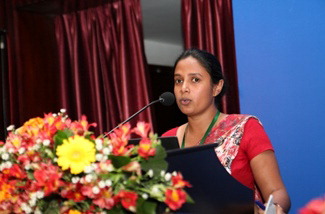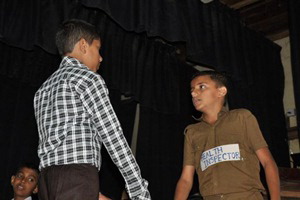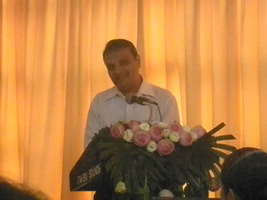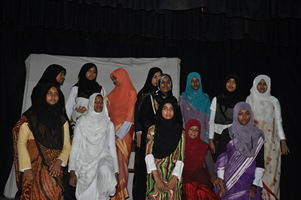Cycle 1 (2011 Deadline)
Intra-seasonal climate predictions for Sri Lanka and Maldives for water resources management
PI: Lareef Zubair, Foundation for Environment, Climate and Technology, Mahaweli Authority of Sri Lanka
U.S. Partner: Adam H. Sobel, Columbia University
Project Dates: May 2012 - September 2015
Project Overview

Sewwandhi Chandrasekera presents "Meteorology and Predictability of Tropical Storm ARB-04 (TC5) in the Indian Ocean during November 2011" at the Sri Lanka Water Convention.
|
Climate fluctuations at intra-seasonal time scales (beyond a few days to a few months) have profound influences on management of water resources to generate hydroelectricity and irrigate agricultural lands. Any ability to anticipate these fluctuations is valuable. Recent improvements in understanding of intra-seasonal (IS) climate variability and the availability of real-time satellite-based observations have led to the emergence of methodologies for IS climate predictions from a few days up to a month. This project used climate variability insights from a National Science Foundation-sponsored program called DYNAMO to focus on the Western Equatorial Indian Ocean.
Specifically, these PEER researchers tested IS climate predictions and assessed their use for water management in Sri Lanka, promoted a better understanding of IS variability of rainfall around Sri Lanka and Maldives, refined prediction schemes, translated this information to support water management, and upgraded local capacity for climate science and climate services.
Even modest improvements in IS predictions can lead to significant social and economic consequences from anticipatory water management. Because of the principal investigator's affiliation with the Mahaweli Authority of Sri Lanka, which is the nation's coordinating agency for water management, the project has potential for near-term and longer-term impact as improved prediction models are developed and tested.
Final Summary of Project Activities
Throughout the PEER project, the PI and his team monitored, gathered, and disseminated weather data and models, including updated climatic data sets for both Sri Lanka and the Maldives through 2014. The team installed four automated weather observation stations as part of this project, which recorded rainfall, temperature, wind, humidity and pressure every 15 minutes. They also obtained new meteorological data through developing a new web-scraper code, with an analysis carried out in collaboration with the U.S. partner.
The PEER team shared their models and results throughout Sri Lanka and the Maldives, primarily through the generation of weekly and monthly climate advisories for Sri Lanka and Maldives online through a purpose-built website and social media channels. The team also created an annual climate report for Sri Lanka. The PI and others presented their results through lectures, conference presentations both in the target countries and internationally.
The project team also developed short videos (5-10 minutes) on causes of flooding, water scarcity and sustainable practices for the Greater Male region and drafted a report on Climate and Water in Sri Lanka for a general audience.
Due to the extended drought during part of the project period and increasing information requests from regional stakeholders, the team distributed drought monitoring products throughout Sri Lanka and the Maldives.
This work continued as part of separate PEER grants in Cycles 3 and 4.
Publications
L. Zubair et al. 2015. Climate Change Impacts on Rice Farming Systems in Northwestern Sri Lanka. Chapter 10 in Handbook of Climate Change and Agroecosystems: The
Agricultural Model Intercomparison and Improvement Project (AGMIP). Joint publication with ASA, CSSA, and SSSA. Imperial College Press.
S. McDermid, P. Agalawatte, E. Wijekoon, L. Zubair, et al. 2015. The AgMIP Coordinated Climate-Crop Modeling (C3MP): Methods and Protocols. Chapter 8 in Handbook of
Climate Change and Agroecosystems: The Agricultural Model Intercomparison and Improvement Project (AGMIP). Joint publication with ASA, CSSA, and SSSA. Imperial College Press.
Climate data from this project are available at the following websites:
 During World Environment Day activities at During World Environment Day activities at
Azhar Central School in June 2013,
schoolchildren put together a drama on
community responses to Dengue fever. |  Lareef Zubair presents his workshop on Lareef Zubair presents his workshop on
mainstreaming climate information applications
for enhancement of agroecosystem services
and functions in the Nilwala Basin in May 2013. | 
During World Environment Day activities in
June 2013, Akurana Balika Vidyalaya
students staged a production on the
importance of the Pinga Oya River. |







